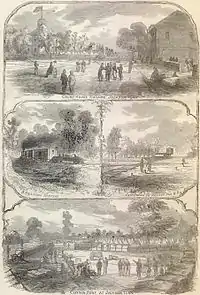Battle of Jackson, Tennessee
The Battle of Jackson, also known as the Battle of Salem Cemetery, was fought on December 19, 1862, in Madison County, Tennessee, during the American Civil War.
| Battle of Jackson, Tennessee | |||||||
|---|---|---|---|---|---|---|---|
| Part of American Civil War | |||||||
 Scenes from Jackson, done three months before the battle | |||||||
| |||||||
| Belligerents | |||||||
|
|
| ||||||
| Commanders and leaders | |||||||
| Adolph Englemann | Nathan Bedford Forrest | ||||||
| Units involved | |||||||
| Jackson garrison | Forrest's Cavalry Division | ||||||
| Strength | |||||||
| Unknown | 400 cavalry | ||||||
| Casualties and losses | |||||||
| 6 | Unknown | ||||||
Background
The engagement at Jackson occurred during Confederate Brig. Gen. Nathan Bedford Forrest's Expedition into West Tennessee, between December 11, 1862, and January 1, 1863. Forrest wished to interrupt the rail supply line to Maj. Gen. Ulysses S. Grant's army, campaigning down the Mississippi Central Railroad. If he could destroy the Mobile & Ohio Railroad running south from Columbus, Kentucky, through Jackson, Tennessee, Grant would have to curtail or halt his operations. Forrest's 2,100-man cavalry brigade crossed the Tennessee River from December 15 to December 17, heading west.[1] Grant ordered a troop concentration at Jackson under Brig. Gen. Jeremiah C. Sullivan and sent a cavalry force out under Col. Robert G. Ingersoll, to confront Forrest. Forrest, however, smashed the Union cavalry at Lexington on December 18.[1]
Battle
As Forrest continued his advance the next day, Sullivan ordered Col. Adolph Englemann to take a small force northeast of Jackson. At Old Salem Cemetery, acting on the defensive, Englemann's two infantry regiments repulsed a Confederate mounted attack and then withdrew a mile closer to town. To Forrest, the fight amounted to no more than a feint and show of force intended to hold Jackson's Union defenders in place while two mounted columns destroyed railroad track north and south of the town and returned. This accomplished, Forrest withdrew from the Jackson area to attack Trenton and Humboldt. Thus, although the Federals had checked a demonstration by a portion of Forrest's force, a major accomplishment, other Confederates had fulfilled an element of the expedition's mission.[1]
Notes
- NPS Archived September 23, 2010, at the Wayback Machine
Further reading
- Wills, Brian Steel. The Confederacy's Greatest Cavalryman: Nathan Bedford Forrest. Lawrence: University Press of Kansas, 1992. ISBN 0-7006-0885-0.